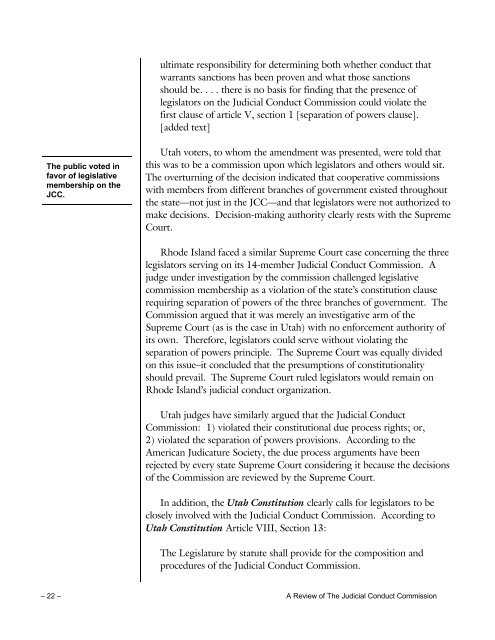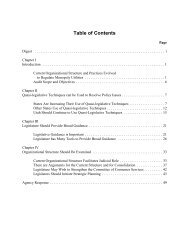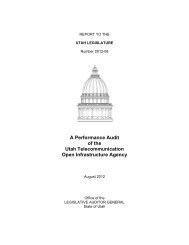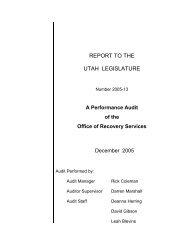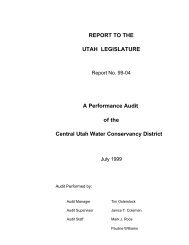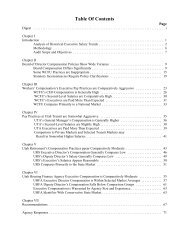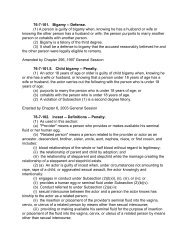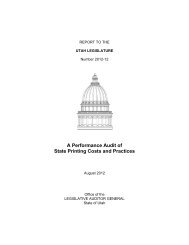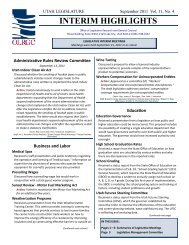A Review of the Judicial Conduct Commission - Utah State Legislature
A Review of the Judicial Conduct Commission - Utah State Legislature
A Review of the Judicial Conduct Commission - Utah State Legislature
You also want an ePaper? Increase the reach of your titles
YUMPU automatically turns print PDFs into web optimized ePapers that Google loves.
ultimate responsibility for determining both whe<strong>the</strong>r conduct thatwarrants sanctions has been proven and what those sanctionsshould be. . . . <strong>the</strong>re is no basis for finding that <strong>the</strong> presence <strong>of</strong>legislators on <strong>the</strong> <strong>Judicial</strong> <strong>Conduct</strong> <strong>Commission</strong> could violate <strong>the</strong>first clause <strong>of</strong> article V, section 1 [separation <strong>of</strong> powers clause].[added text]The public voted infavor <strong>of</strong> legislativemembership on <strong>the</strong>JCC.<strong>Utah</strong> voters, to whom <strong>the</strong> amendment was presented, were told thatthis was to be a commission upon which legislators and o<strong>the</strong>rs would sit.The overturning <strong>of</strong> <strong>the</strong> decision indicated that cooperative commissionswith members from different branches <strong>of</strong> government existed throughout<strong>the</strong> state—not just in <strong>the</strong> JCC—and that legislators were not authorized tomake decisions. Decision-making authority clearly rests with <strong>the</strong> SupremeCourt.Rhode Island faced a similar Supreme Court case concerning <strong>the</strong> threelegislators serving on its 14-member <strong>Judicial</strong> <strong>Conduct</strong> <strong>Commission</strong>. Ajudge under investigation by <strong>the</strong> commission challenged legislativecommission membership as a violation <strong>of</strong> <strong>the</strong> state’s constitution clauserequiring separation <strong>of</strong> powers <strong>of</strong> <strong>the</strong> three branches <strong>of</strong> government. The<strong>Commission</strong> argued that it was merely an investigative arm <strong>of</strong> <strong>the</strong>Supreme Court (as is <strong>the</strong> case in <strong>Utah</strong>) with no enforcement authority <strong>of</strong>its own. Therefore, legislators could serve without violating <strong>the</strong>separation <strong>of</strong> powers principle. The Supreme Court was equally dividedon this issue–it concluded that <strong>the</strong> presumptions <strong>of</strong> constitutionalityshould prevail. The Supreme Court ruled legislators would remain onRhode Island’s judicial conduct organization.<strong>Utah</strong> judges have similarly argued that <strong>the</strong> <strong>Judicial</strong> <strong>Conduct</strong><strong>Commission</strong>: 1) violated <strong>the</strong>ir constitutional due process rights; or,2) violated <strong>the</strong> separation <strong>of</strong> powers provisions. According to <strong>the</strong>American Judicature Society, <strong>the</strong> due process arguments have beenrejected by every state Supreme Court considering it because <strong>the</strong> decisions<strong>of</strong> <strong>the</strong> <strong>Commission</strong> are reviewed by <strong>the</strong> Supreme Court.In addition, <strong>the</strong> <strong>Utah</strong> Constitution clearly calls for legislators to beclosely involved with <strong>the</strong> <strong>Judicial</strong> <strong>Conduct</strong> <strong>Commission</strong>. According to<strong>Utah</strong> Constitution Article VIII, Section 13:The <strong>Legislature</strong> by statute shall provide for <strong>the</strong> composition andprocedures <strong>of</strong> <strong>the</strong> <strong>Judicial</strong> <strong>Conduct</strong> <strong>Commission</strong>.– 22 – A <strong>Review</strong> <strong>of</strong> The <strong>Judicial</strong> <strong>Conduct</strong> <strong>Commission</strong>


